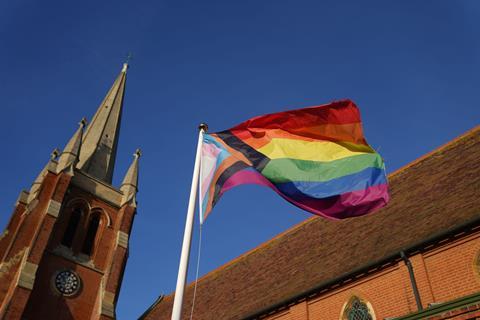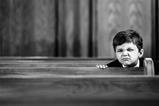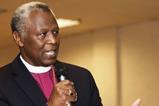General Synod has agreed to trial standalone services of blessing for gay couples, as well as concessions for parishes who do not wish to use them. Meanwhile, discussions continue around marriage for gay vicars. The margins are tiny, says Tim Wyatt, but both sides seem as far apart as ever. Is it only a matter of time before schism occurs?

The Church of England has taken its next slow step towards gay blessings after another tense debate at General Synod. A razor-thin majority approved the bishops’ latest plans.
What was just agreed?
The Church of England’s General Synod has voted in favour of the roadmap proposed by the Church’s governing House of Bishops. This will see services of blessings for same-sex couples rolled out some time next year as part of a three-year trial.
The vote also signed off on the outline of a package designed to appease conservatives unhappy about gay blessings. This offers parishes unwilling to use the Prayers of Love and Faith (PLF) the opportunity to request a like-minded conservative bishop from elsewhere in the Church be appointed to oversee them, rather than their local bishop.
There was less progress on the third strand of the project, which is rewriting the rules on whether gay vicars can enter civil same-sex marriages. The House of Bishops said they would decide on this early next year after the Church’s theological advisory committee had finished a report on the question.
Hang on, I thought they’d already done all this?
Well, kind of. The PLF were first proposed back in February 2023 and, again, narrowly voted through by synod members. However, in November 2023 the bishops backtracked slightly, splitting the proposed new prayers into two. Blessings which could be used as part of regular Sunday services would be rolled out immediately, but standalone services of blessings would have to wait.
The bishops have consistently said they are not changing CofE marriage doctrine
The standalone services were, in some ways, the big demand from the liberal wing of the Church, as they would most closely resemble actual church weddings, and could happen outside of a typical worship service. But legal advice given to the bishops - and a vociferous campaign of opposition from conservatives – led to a change of policy. It was decided that the standalone services would not be introduced simply on the bishops’ say-so, but instead be passed through the formal synod authorisation process for creating new liturgy.
This would take several years to make its way past various legal hurdles and would eventually need a two-thirds majority vote in synod. While the pro-PLF faction does currently have a narrow majority in the chamber, it is not close to the two-thirds required.
So, is this what has now happened?
No. The backtracking from the bishops on standalone services infuriated the liberal wing, who saw it as a betrayal of the original February 2023 vote. In response to this backlash, the bishops changed approach yet again and proposed another compromise – the standalone services would be brought in straight away, but only for a trial period of a few years. This was passed by the synod in November, but again by the smallest of margins.
After another round of complex wrangling over Church law, it is this experimental three-year trial that has now been signed off by the synod. But this has not assuaged the conservatives; if anything it has upset them more. Many argue that the bishops are bending Church and synod rules to force through the PLF on flimsy theological and legal grounds.
Church rules state that new kinds of prayers and services must not be contrary to its written doctrine. The bishops have consistently said they are not changing the CofE’s marriage doctrine, which continues to be that marriage is only for one man and one woman. Instead, they argue that blessing gay couples does not contradict this because the PLF are ambivalent as to whether the couple are civilly married, and only offer God’s blessing on the good things in their relationship.
What are the bishops offering the conservatives?
In an effort to head off a split, the bishops have long promised they would put some kind of provision in place for vicars and churches which reject the PLF. This proposal is called “delegated episcopal oversight” and would see conservative churches serving in dioceses led by liberal bishops given the chance to request a conservative bishop instead. The local bishop would then delegate most of their role to an alternative bishop appointed from elsewhere in the Church.
The backtracking on standalone services infuriated the liberal wing
The bishops have insisted this is a major concession, but conservatives have rejected it outright and continue to call for stronger legal separation between the parts of the Church which will and won’t use the PLF. They want permanent transferred oversight, with conservative parishes grouped together in their own province with their own bishops, control over their doctrine, ordination of new clergy and theological training. The CofE hierarchy has consistently said this is not necessary and would amount to a damaging quasi-schism or a “Church within a Church”.
During the recent synod debate, many conservatives spoke against the PLF and the conscience provisions offered by the bishops, warning that if their demands were not met, they would be forced to leave the CofE entirely.
What happens next?
Now that the outline of a settlement has been approved, the bishops will finalise the details. Guidance on how to use the standalone services of blessing will be written (including how to ensure they do not become de facto marriage services), and detail on how delegated episcopal oversight will work will also be figured out.
In January 2025, the bishops will receive a report from the CofE’s theological advisory committee on the one remaining unresolved issue – can gay vicars get married? The current rules state that gay clergy can only enter civil partnerships, and must remain celibate if they do - but the liberal wing is determined to overturn this. However, it is legally complex as clergy take oaths to uphold the teaching of the Church in their personal lives, and the doctrine of the CofE remains that marriage is only for heterosexual couples.
The bishops have asked the committee to advise on how doctrine can develop or expand, and whether it would be acceptable to let priests enter civil gay marriages even if the Church’s teaching states the opposite. Their decision will then be voted on at the next synod meeting in February 2025.
Is this a victory for the liberals then?
Yes and no. Despite fevered campaigning and lobbying over the past 18 months, the conservative wing have not been able to collect the handful of additional votes needed at synod to block the proposals.
Among the clergy and laity in particular, they are consistently outvoted by between one and five votes. Therefore, at every synod since February 2023, the bishop’s plans to push forward with the PLF have been approved – if only by a tiny majority.
It is possible that any priest who uses PLF next year could be taken to court
But the conservatives’ energetic advocacy has helped delay what was originally thought to be inevitable – the lifting of the ban on gay vicars getting married. They have also won a partial compromise in the trial period for standalone services rather than a permanent introduction. And their consistent and well-disciplined blocking minority of approximately 45 per cent of the synod has meant any hope of actually changing CofE doctrine – which would allow for the introduction of full-fat gay marriage in churches - has been abandoned for now.
Furthermore, the Alliance – an umbrella group of Anglicans who oppose the PLF, and which includes prominent figures from the HTB network such as Nicky Gumbel and Archie Coates – have pledged to move forward with their own plan in defiance of bishops.
Rejecting the official suggestion of delegated episcopal oversight, the Alliance has said it will set up a “de facto parallel province” for anti-PLF churches. Another group, the Church of England Evangelical Council (CEEC) will shortly begin commissioning “overseers” (including some retired bishops) to act as informal bishops for conservative vicars in liberal dioceses.
However, what these unilateral moves will really mean is unclear, and any kind of unofficial system will not remove the legal responsibilities of vicars to their official local bishop.
A final wrinkle is that, according to Church law, it is not the bishops themselves who determine if a new service or set of prayers is contrary to doctrine. Even though the PLF will be officially approved by the Church, it is possible that any priest who uses them next year could be taken to court for allegedly breaching doctrine.
Then there would be an arcane, complex and expensive legal fight through the ecclesiastical court system, before an obscure panel of judges and bishops makes a definitive ruling on the PLF.
Some parts of the Alliance have hinted that this is an inevitable outcome of the bishops’ proposals, but it remains to be seen if it does, in fact, come to that.







































7 Readers' comments